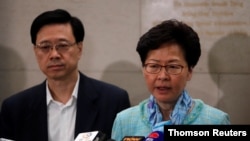After several weeks of controversy and large, angry street protests, Hong Kong leader Carrie Lam says legislation that would have allowed extraditions to mainland China is "dead."
In announcing the decision Tuesday during a news conference, the embattled Lam conceded the public still had "lingering doubts about the government's sincerity or worries whether the government will restart the process in the legislative council."
Lam called the attempts at passing the bill "a total failure," but did not say whether the bill is being withdrawn, as protesters have demanded.
The bill sparked massive demonstrations from the moment it was introduced in April, with opponents alarmed about extraditing criminal suspects to China, which has a substantially different legal system than Hong Kong. The sentiment was shared along a wide cross section of Hong Kong society, from international business groups to legal societies and pro-democracy parties.
Lam suspended the bill in mid-June before its second reading in the legislature after a massive protest outside the Hong Kong government's headquarters. The demonstrations continued despite Lam's actions, including one last Monday on the anniversary of the city's reunification with China that ended with a group of protesters breaking into the legislative building and going on a rampage. Furniture and equipment were damaged, and walls defaced with spray paint and anti-Beijing graffiti.
Leaders of the protest movement told reporters later Tuesday they were unmoved by Lam's decision, and urged her to meet directly with the demonstrators. In addition to the withdrawal of the bill, the protesters are also demanding an independent probe into allegations of police abuse against them during the demonstrations.
The former British colony was granted special autonomy for 50 years after it returned to Chinese sovereignty in 1997. But many in Hong Kong are concerned that China is slowly encroaching on those rights and tightening its grip on the territory.
The extradition debate has seen the government unwittingly reignite Hong Kong’s protest movement, and calls for the direct election of its leader, five years after 2014’s so-called Umbrella Movement democracy protests came to an end.













